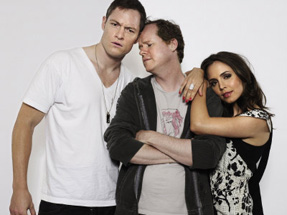Mythology: Prophesies
By Martin Felipe
August 26, 2009
BoxOfficeProphets.com

Blah, blah, blah, boring behind-the-scenes nonsense that really means very little to the show's few fans, just so long as we get enough episodes to assure this maligned franchise a little respectability. Of course, the odds of this happening seem diminishing when such daring episodes as Epitaph One are available only to DVD consumers.
Okay, there it is, full disclosure, I thought the 13th episode was awesome. It takes place about ten years from now in a post-apocalyptic Los Angeles where the imprinting technology has gone wrong and, in true post-apocalyptic storytelling fashion, we follow a rag-tag group of survivors as they uncover some of the mystery of just what happened to Los Angeles. I'm a sucker for post-apocalyptic stories, what can I tell you? I would assume that season two and (hopefully) beyond will start to fill in the gaps between the Dollhouse of 2009 and the desolation of 2019.
Yet, here's where the problem comes in, and it's a problem for mythology shows in general. One major tenet of the genre is that of prophecy. Of course, foreshadowing is a tool in most all fiction, but the more fantasy based stories often include prophesies in their storytelling. Alias, Buffy the Vampire Slayer, Angel, The X-Files, Battlestar Galactica, Heroes, to name but a few, all have ‘em. They're often vaguely worded mumbo-jumbo about some vital future event in the lives of our characters that eventually comes to pass. Rarely do they happen as we or the characters expect, in fact, it's often their refusal to accept the truth of them that leads to their realization. However, as per the rules of storytelling, if you foreshadow it, it must come.
In the case of Dollhouse, it's not prophesy in the way I explain above, but it's pretty much the same thing. We know that all hell will break loose in Dollhouse LA circa 2019; all we have to do now is see it happen. Again, foreshadowing, nothing new in storytelling of any kind. It makes a tale seem cohesive, efficient, all events part of a greater whole. The downside is, we know where all of this is going. That robs us of some of our emotional investment. The inevitability of the future can make the story an intellectual exercise. We watch the pieces fit into place in a puzzle, the endgame of which we already know.
A great illustration of this is the Star Wars prequels. I know these are some of the more culturally problematic films of the past decade, but I'm just going to focus on one of their problems. (In other words, yes, Jar Jar sucks, but let's let that go for now.) We know that Anakin goes on to father twins, put on a black suit, kill Obi Wan, and so forth. So, in Attack of the Clones, when he, Padme and Obi Wan are about to be executed on Geonosis, we know they will survive to participate in those future events. So there's no tension in the scene. It becomes a hollow exercise in flashy effects.
I think this is also part of the reason why many people had such a hard time accepting the "whatever happens, happens" theory of time travel in season five of Lost. If the impact of our Losties in the '70s already happened, then we already know the end result. This makes for clever storytelling, but has the potential for emotionally uninvolving storytelling. For that matter, not to get too heady here, but it does touch upon the philosophical concepts of pre-destination, a troubling idea for many, that we have no free will, that we're just puppets in some cosmic scheme. Okay, I did get heady, moving on.
In my opinion, Lindelof and Cuse are very clever in how they handle the problem. I was riveted as I watched season five and the general response from critics and viewers was glowing. I'm pretty sure that we're in good hands with Whedon as well. He certainly confounds our prophetic expectations on Buffy and Angel, and I'm confident that he'll do so again with Dollhouse - if he gets the chance. FOX is behind it more now than when it started, but I'd be naïve to assume it's on safe ground. So what am I saying here? I'm saying watch the damned thing. What, would you prefer Heroes?